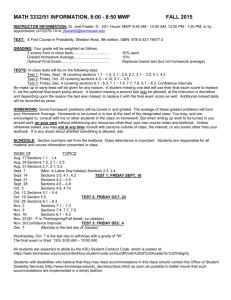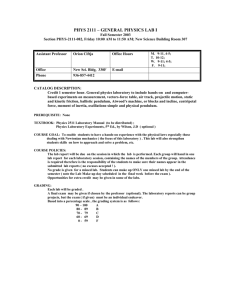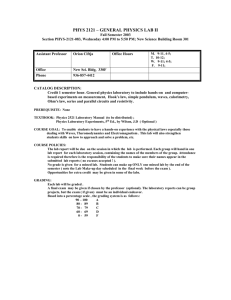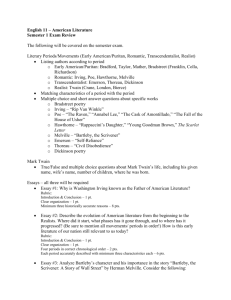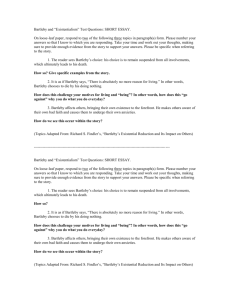Art and Politics
advertisement
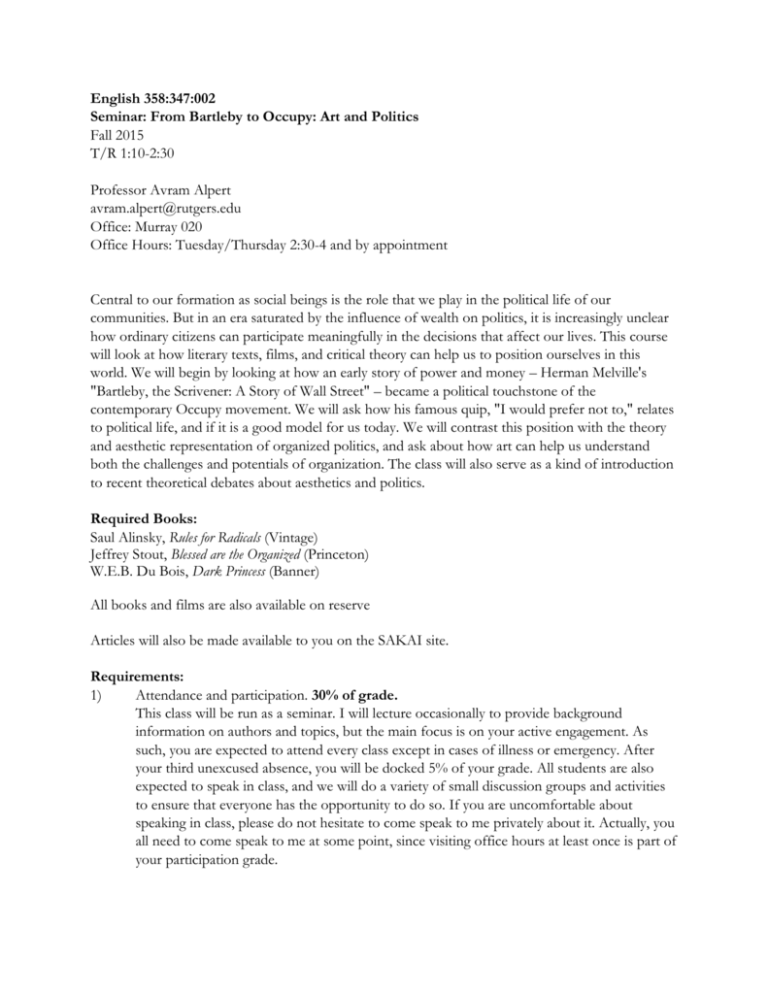
English 358:347:002 Seminar: From Bartleby to Occupy: Art and Politics Fall 2015 T/R 1:10-2:30 Professor Avram Alpert avram.alpert@rutgers.edu Office: Murray 020 Office Hours: Tuesday/Thursday 2:30-4 and by appointment Central to our formation as social beings is the role that we play in the political life of our communities. But in an era saturated by the influence of wealth on politics, it is increasingly unclear how ordinary citizens can participate meaningfully in the decisions that affect our lives. This course will look at how literary texts, films, and critical theory can help us to position ourselves in this world. We will begin by looking at how an early story of power and money – Herman Melville's "Bartleby, the Scrivener: A Story of Wall Street" – became a political touchstone of the contemporary Occupy movement. We will ask how his famous quip, "I would prefer not to," relates to political life, and if it is a good model for us today. We will contrast this position with the theory and aesthetic representation of organized politics, and ask about how art can help us understand both the challenges and potentials of organization. The class will also serve as a kind of introduction to recent theoretical debates about aesthetics and politics. Required Books: Saul Alinsky, Rules for Radicals (Vintage) Jeffrey Stout, Blessed are the Organized (Princeton) W.E.B. Du Bois, Dark Princess (Banner) All books and films are also available on reserve Articles will also be made available to you on the SAKAI site. Requirements: 1) Attendance and participation. 30% of grade. This class will be run as a seminar. I will lecture occasionally to provide background information on authors and topics, but the main focus is on your active engagement. As such, you are expected to attend every class except in cases of illness or emergency. After your third unexcused absence, you will be docked 5% of your grade. All students are also expected to speak in class, and we will do a variety of small discussion groups and activities to ensure that everyone has the opportunity to do so. If you are uncomfortable about speaking in class, please do not hesitate to come speak to me privately about it. Actually, you all need to come speak to me at some point, since visiting office hours at least once is part of your participation grade. 2) Responses. 10% of grade Each week I will give a question for the reading or film. At least an hour before Thursday's class, post your response to this question on the SAKAI site. Aim to write about a paragraph (You may also respond to some other part of the material that interests you if you prefer.) 3) Presentations (1-2 pages): 10% of grade At the end of the class, you will present your final research project. 4) Final project (12-15 pages). 50% of grade (20% for first, short draft [6-8 pages] and 30% for the second, full draft) One aim of this course if for you to engage in your own extended research project. We will discuss these projects early and often. Ideally your project will involve research (or even participation) in an art and politics project beyond what we study on the syllabus. Of course if you are particularly interested in something on the syllabus and would like to research that further, that's fine, but you should feel encouraged to draw on your other research, interests, and passions to develop a project that's meaningful to you. All seminars in the English department focus on re-writing, an essential part of any writing practice. For this course, you will write a short version of your final project before the Thanksgiving Break. I will give you extensive feedback on this version to help you prepare the final draft, due at the end of the course. IMPORTANT: ON COMPUTERS, TABLET AND SMART PHONES There are many wonderful things about computers and smart phones, and we all use them all the time to very good effect. But electronics are also distracting to ourselves and to others around us, and they fragment the attention in a classroom. Our aim here is to be a community of readers working together to think through a number of difficult books, films and ideas, and we will need to focus as closely on those texts as possible. If necessary, please advise friends or family ahead of time that, except for emergencies, you will not be reachable during this class period. You may use a computer in this class to access the readings, but your internet must be turned off before class starts. The only exception is when you are doing a presentation and need the internet. Schedule of Course Readings (Subject to change based on your interests – we will discuss this the first day): Sept 1st: Introductions. Sept 3rd: Herman Melville, "Bartleby, the Scrivener: A Story of Wall Street" Sept 8th: Giorgio Agamben, "Bartleby, or On Contingency" Sept 10th: Lee Edelman, "Occupy Wall Street: 'Bartleby' Against the Humanities" Russ Castronovo, "Occupy Bartleby" Jonathan Greenberg, "Occupy Wall Street's Debt to Bartleby" Sept 15th: Jean Paul Sartre, "What is Literature?" (excerpt) Sept 17th: Theodor Adorno, "Commitment" Sept 22nd: Frantz Fanon, "On National Culture" Sept. 24th: W.E.B. Du Bois, Dark Princess, first third Sept 29th: W.E.B. Du Bois, Dark Princess, second third Oct 1st: W.E.B. Du Bois, Dark Princess, final third Oct. 6th: Saul Alinsky, Rules for Radicals, first half Oct. 8th: Saul Alinsky, Rules for Radicals, second half Oct. 13th: Jeffrey Stout, Blessed are the Organized, first third Oct. 15th: Jeffrey Stout, Blessed are the Organized, second third Oct. 20th: Jeffrey Stout, Blessed are the Organized, final third Oct. 22nd: James C. Scott, "Hegemony and Consciousness: Everyday Forms of Ideological Struggle" Claire Bishop, "Pedagogic Projects" Oct. 27th: Akira Kurosawa, Ikiru Oct. 29th: Ikiru continued Talal Asad, On Suicide Bombing (excerpt) Nov. 3rd: Jean-Luc Godard, La Chinoise Nov. 5th: La Chinoise continued Jacques Rancière, "The Red of La Chinoise: Godard's Politics" Nov. 10th: Barbara Kopple, Harlan County, U.S.A. Nov. 12th: Harlan County, continued Janet Jakobsen, "Working Alliances" Nov. 17th: Selma Various short reviews Nov. 19th: Hunger Games Part 1: Mockingjay Various short reviews Nov. 24th: Mad Max: Fury Road Various short reviews First draft of paper due (Nov 24) Dec. 1st: Re-read "Bartleby, The Scrivener" Documents about "G.U.L.F. Labor" and "Occupy Guggenheim" Dec. 3rd: Student Presentations Dec. 8th: Student Presentations Final project due last day of exam period




